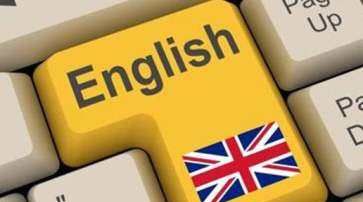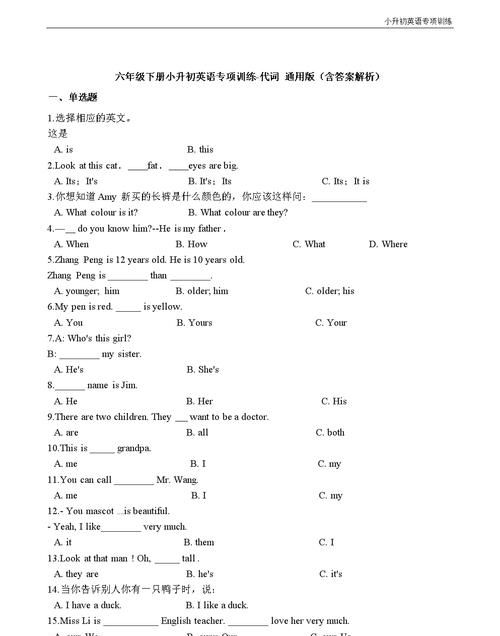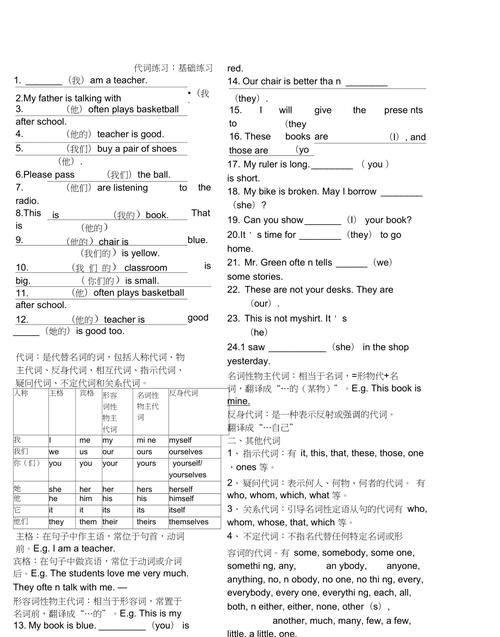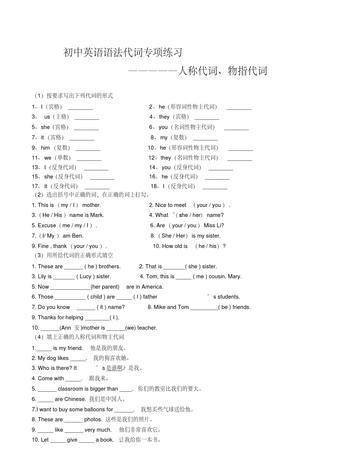本文目录
科普版小升初英语真题试卷及答案
科普版小升初英语试卷及答案
英语一直扮演着重要角色,学习英语的重要性已经众所皆知,下面就是我给大家准备的科普版的.小升初英语试卷及答案,一起来练习一下吧!

科普版小升初英语试卷及答案
一、找出划线部分读音与众不同的单词。(10分)
( )1. A. big B. sixC. nice D. miss
( )2. A. workB. wall C. whoseD. watch
( )3. A. sorry B. brotherC. some D. does
( )4. A. yesterday B. familyC. day D. Monday
( )5. A. hearB. pear C. ear D. near
( )6. A. map B. stampC. faceD. cat
( )7. A. three B. thoseC. their D. these
( )8. A. foodB. foot C. bookD. good
( )9. A. not B. no C. ink D. ant
( )10.A. names B. apples C. faces D. balls
二、请你按要求完成下列各题。(10分)
(I)
1. shoes(单数)__________
2. bus(复数)__________
3. don't(完全形式) __________
4. me(主格) __________
5. too(同音词) __________
6. he(物主代词) __________
7. 努力工作(译成英语) __________
8. let us(缩写形式) __________
9. short(反义词) __________
10. over there(汉语意思)__________
(II)翻译下面的短语
1. 二瓶果汁___________
2. 到这来 ___________
3. 在树下 ___________
4. 双胞胎兄弟 ___________
5. how much ___________
6. thanks a lot ___________
7. look after ___________
8. put on ___________
9. 在天空中___________
10. 穿红衣服的女孩 ___________
三、根据题意,用所给词的适当形式填空。(10分)
1. Can I have ______(a) orange?
2. She _____(like) to play the flute.
3. He _____(have) got a skipping rope.
4. Please give _____(I) a cup of tea.
5. Let's go _____(shop) with my mother!
6. Da Ming comes from China,he is _____(China).
7. How many _____(hour) are there in a day?
8. Lucy _____(look) like her father.
9. "Here you are. ""_____(thank)."
10. She ______(watch) TV every evening.
四、根据提供的情景,选择正确的句子,将其标号填在题前的括号内。(8分)
A. Let's go to the zoo.B. Can you spell "window"?
C. Good evening, Dad. D. Good night.
E. This is Mr Zhang. F. Look at the new car.
G. Come and sit here.H. It's my favourite colour.
( )1. 傍晚见到父亲说:___________
( )2. 你想说这是我最喜欢的颜色:________
( )3. 你想叫人拼写窗户这个单词,可以说:_________
( )4. 你叫汤姆过来坐,可以说:________
( )5. 你想请别人欣赏这辆红色法拉利小轿车,可以说:_______
( )6. 想邀请别人一起去动物园,可以说:________
( )7. 睡前对母亲说晚安,应表达为:________
( )8. 你向Helen介绍一下张老师,应该说:______
五、选择填空。(30分)
( )1. What's this in English? _____ a jeep.
A. This isB. That'sC. It'sD. it is
( )2. Where's the bag?
A. It's in the car.B. They are here.C. There are.D. Here are.
()3. What's that man?
A. He's my brother.B. Yes,he is.C. She's a teacher.D. He's a teacher.
()4. It's _____ my new car.
A. /B. aC. isD. isn't
() 5. ____ a cat.
A. ThisB. This'sC. This isD. That
( )6. Look ____ the nice car.
A. toB. andC. atD. in
( )7. It's nine o'clock. I must ______.
A. go homeB. go to home C. to go homeD. go the home
() 8. _____ you see the blackboard?
A. DoB. AreC. IsD. Can
( )9. Please give ____ a cup of tea.
A. sheB. heC. ID. him
( ) 10. It's time ____ play games.
A. inB. onC. forD. to
( )11. The man _______ the photo is my father.
A. inB. on theC. in theD. under
( )12. _____ name is Mike.
A. IB. MyC. MeD. mine
( )13. Who is the _____? He is my uncle.
A. boyB. manC. womanD. girl
( )14. _____ you like this jacket?
A. AreB. DoC. CanD. What
( )15. ______ is my umbrella? It's over there.
A. WhereB. WhatC. WhoseD. how
( )16. What's that ____ English?
A. forB. inC. onD. under
( )17. Look! The cat is _______.
A. walkB. runC. ranD. running
( ) 18. Whose gloves are they? ____ my _____.
A. It's,mother'sB. They're,mother'sC. They're,motherD. It's,mother
( ) 19. The boys are from Tokyo. They are ______.
A. ChinaB. EnglishC. JapaneseD. Chinese
( ) 20. There are _____ on the table.
A. two bottles of milkB. two bottles milk
C. two bottles of milksD. two bottle of milk
( )21. "Can I help you?""I'd like ______ bags of rice. "
A. someB. aC. littleD. one
( )22. "What would you like?""I'd like _____ to eat."
A. somethingB. appleC. meatD. some orange
()23. Look! Some meat ____ in the box. Some apples _____ in the basket.
A. are,areB. is,isC. are,isD. is,are
( )24. I would like ________.
A. some bananaB. eat some bananasC. some bananas eatD. some bananas
()25. Please give me two bottles of _______.
A. milkB. watersC. milksD. oranges
()26. Well,would you like _____ to drink?
A. some thingB. anythingC. some thingsD. something
( )27. ____ would you like _____ breakfast?
A. What,withB. What,forC. What,atD. How,for
()28. I want some
A. meatsB. watersC. cakesD. breads
( )29. What about __________?
A. something to eatB. to eat somethingC. something eatD. eat something
( )30. "Do you want _____ orange?""No,I'd like _____ bottle of orange."
A. a,anB. an,anC. the,anD. an,a
;小升初英语语法专项训练试卷
专项训练---情态动词
一.根据提示完整回答问题。(完整回答)
1.Can the Robot sweep the floor?
2.Can your brother do housework?
3.What can you do? (扫地和洗衣服)
4.What can your sister do? (打扫卧室和浇花)
5.What do you have for breakfast? (茄子和青豆)
二、根据答句写问句。
1. ______________________________________? Yes, I can do the dishes.
2. ___________________________________? Yes, we can empty the trash.
3. _____________________________________? Yes, he can make the bed.
4. _________________________________? Yes, Tom can wash the clothes.
5. ______________________________? Yes, Amy can water the flowers.
6. _____________________________? No, they can clean the bedroom.
7. _______________________________________? I can cook the meals.
8. _______________________________________? We can play football.
9. ___________________________________? Tom can use a computer.
10. ___________________________________? Sarah can sweep the floor.
11. ___________________________________? My father can wash the car.
12. ________________________________? My mother can sing and dance.
三、短文填空。(用所给的单词填空, 使短文完整,每格一词)
( empty, friend, helpful, strict, use, teacher, violin, wash, Amy, home, sing, active )
I have a new ______________. She’s __________ . She’s__________.
She can __________ many English songs, _________ a computer and play
the ____________. She’s also a good child at _____________.
She can ___________ the trash and _____________ the clothes for her mother. She’s very ________________.
专项训练---实义动词
一、用所给词的适当形式填空:
1.He______swimming in the river every day in summer. (go)
2.It________you are right. ( seem )
3.Look, the children______ basketball on the playground. ( play ) 4.He______to the radio when I came in, ( listen )
5.It is very cold .I think it______ . ( rain )
6.I need some paper . I______ some for you . ( bring )
7.I cant find my pen . Who______it ? ( take )
8.He said that he______back in five minutes . ( come )
9.I didnt meet him. He______ when I got there. ( leave )
10.I______my bike, so I have to walk to school. ( lose )
11.He______down and began to read his newspaper. ( sit )
12.He is very hungry. He_________ anything for three days. ( not eat )
13.I______with you if I have time . ( go )
14.We will go to the cinema if it______fine . (be )
15.I will tell her the news when she______to see me next week. (come)
16. When______you______the car ? In 1998 . ( buy )
17.We______good friends since we met at school . (be)
18.What______you______ at five yesterday afternoon ? (do)
19.The bike is nice . How much______it______? (cost)
二、选择最佳答案填空
( )1.Well go swimming if the weather______fine tomorrow.
A. is B.was C. will be D.is going to be
( )2.It______five years since he has left for Beijing.
A. was B. has been C.is D.is going to be
( )3.Please dont leave the office until your friend______back.
A.came B.comes C.have come D.will come
( )4.By the end of last year he______about 1500 English words.
A. learns B.learned C.was learning D.had learned
( )5.Listen ! Someone______in the next room .
A.cried B.crying C.is crying D.has cried
( )6.You must tell him the news as soon as you______him.
A.see B.sees C.will see D.is seeing
( )7.He told me that he______to see us the next day.
A.comes B. came C. will come D. would come
( )8.We cant find him anywhere . Perhaps he______home.
A. is going B. went C. has come D. would come
( )9.The teacher told us that the sun______bigger than the earth.
A. is B. was C. has been D.will be
( )10.Could you tell me where the railway station______?
A. was B. is C. will be D. would be
专项训练---人称代词 物主代词
1. is my teacher. I like very much. (she)
2. (he) lives in Shanghai. He likes .(it)
3. Please listen to (I)
4. Do you like ?(she)
5. He looks after (they) at home.
6. Please tell (we) the answer.
7. I teach (he) English every day.
8. (she) is twelve years old.
9. (me) am a student.
10. (we) are good friends.
11. What is (he) phone number?
12. How do spell name?(you)
13. is a nice girl. name is Jenny.(she)
14. That is ID card. (I )
15. school is very beautiful.(we)
16. There are tennis rackets. (me)
17. English teacher is from America.(we)
18. What is (she) name?
19. Where are bags?(they)
20. (it) name is Kitty.
21. My watch is old, but (she) is new.
22. Can I borrow your pen? Is broken. (I )
23. Please send best wishes to Mary. (I )
24. This is my book. Is on the desk.(he)
25. We love our country, and they love (they), too.
26. Jim, it that cars (your)?
27. This isn’t our room. (we) is over there.
28. This book is (her) and that one is .(my)
29. You can’t find the dictionary. You may have (my)
30. These beautiful flowers are .(our)
31. He sits between Tom and (I ).
32. Let (she) sit next to me.
33. (she) birthday is October 10th.
34. (I) camera is not so expensive as (he), but it works well, too.
35. His country is very small, but (we) is a large one with a long history.
36. George reads the newspaper every morning. That’s (he) habit.
37. Miss Li is my English teacher. (she) last name is Li.
38. He shows (he) photos to .(I )
39. Come and join .(us)
40. Look at the photo. The girl beside (I ) is Nancy.
专项训练---一般现在时
一、写出下列动词的第三人称单数。
drink ________ go _______ stay ________ make ________
look _________ have_______ pass_______ carry ____
come________ watch______ plant_____ fly ________
study_______ brush_______ do________ teach_______
二、用括号内动词的适当形式填空。
1. He often ________(have) dinner at home.
2. Daniel and Tommy _______(be) in Class One.
3. We _______(not watch) TV on Monday.
4. Nick _______(not go) to the zoo on Sunday.
5. ______ they ________(like) the World Cup?
6. What _______they often _______(do) on Saturdays?
7. _______ your parents _______(read) newspapers every day?
8. The girl _______(teach) us English on Sundays.
9. She and I ________(take) a walk together every evening.
10. There ________(be) some water in the bottle.
11. Mike _______(like) cooking.
12. They _______(have) the same hobby.
13. My aunt _______(look) after her baby carefully.
14. You always _______(do) your homework well.
15. I _______(be) ill. I’m staying in bed.
16. She _______(go) to school from Monday to Friday.
17. Liu Tao _______(do) not like PE.
18. The child often _______(watch) TV in the evening.
19. Su Hai and Su Yang _______(have) eight lessons this term.
20. -What day _______(be) it today? - It’s Saturday.
三、按照要求改写句子
1. Daniel watches TV every evening.(改为否定句) ___________________________________________________
2. I do my homework every day.(改为一般疑问句,作否定回答) ________________________________________________________ ____________________________
3. She likes milk.(改为一般疑问句,作肯定回答) _______________________________________________________ ____________________________
4. Amy likes playing computer games.(改为一般疑问句,作否定回答) ________________________________________________________ ____________________________________
5. We go to school every morning.(改为否定句) _______________________________________________________
6. He speaks English very well.(改为否定句) ___________________________________________________
7. I like taking photos in the park.(对划线部分提问) ________________________________________________________
8. John comes from Canada.(对划线部分提问) _________________________________________________
9. She is always a good student.(改为一般疑问句,作否定回答) ________________________________________________________
10. Simon and Daniel like going skating.(改为否定句) ___________________________________________________
四、改错(划出错误的地方,将正确的写在横线上)
1. Is your brother speak English? ___________
2. Does he likes going fishing? ___________
3. He likes play games after class. ___________
4. Mr. Wu teachs us English. ____________
5. She don’t do her homework on Sundays. ____________
专项训练---现在进行时
一、写出下列动词的现在分词:
play________ run__________ swim _________make__________
go_________ like________ write________ ski___________
read________ have_________ sing ________ dance_________
put_________ see________ buy _________ love__________
live_______ take_________ come ________ get_________
stop_________ sit ________ begin________ shop___________
二、用所给的动词的正确形式填空:
1.The boy __________________ ( draw)a picture now.
2. Listen .Some girls _______________ ( sing)in the classroom .
3. My mother _________________ ( cook )some nice food now.
4. What _____ you ______ ( do ) now?
5. Look . They ________( have) an English lesson .
6.They ____________(not ,water) the flowers now.
7.Look! the girls ________________(dance )in the classroom .
8.What is our granddaughter doing? She _________(listen ) to music.
9. It’s 5 o’clock now. We _______ (have)supper now
10.___Helen________(wash )clothes? Yes ,she is .
三、句型转换:
1. They are doing housework .(分别改成一般疑问句和否定句) _____________________________________________________________ _____________________________________________________________
2.The students are cleaning the classroom . ( 改一般疑问句并作肯定和否定回答) __________________________________________________________________________________________________________________________________
3.I’m playing the football in the playground .(对划线部分进行提问) _________________________________________________________________
4.Tom is reading books in his study . (对划线部分进行提问)

小学英语语法题目及答案
***/view/8cb92e22192e45361066f59a.html
这个网站是百度文库里的,语法要点讲解与分析以及例题,应该很有效果
还有一些专项训练
小升初英语语法复习及练习:形容词和副词
六、形容词和副词的比较级复习及练习
一、形容词的比较级
1、形容词比较级在句子中的运用:两个事物或人的比较用比较级,比较级后面一般带有单词than。比较级前面可以用more, a little 来修饰表示程度。than后的人称代词用主格(口语中可用宾格)。
2.形容词加er的规则:
⑴一般在词尾加er ;
⑵以字母e 结尾,加r ;
⑶以一个元音字母和一个辅音字母结尾,应双写末尾的辅音字母,再加er ;
⑷以“辅音字母+y”结尾,先把y变i,再加er 。
3.不规则形容词比较级:
good-better, beautiful-more beautiful
二、副词的比较级
1.形容词与副词的区别 (有be用形,有形用be;有动用副,有副用动)
⑴在句子中形容词一般处于名词之前或be动词之后
⑵副词在句子中最常见的是处于实义动词之后
2.副词比较级的变化规则基本与形容词比较级相同 (不规则变化:well-better, far-farther)
一、写出下列形容词或副词的比较级
old__________ young________ tall_______ long________
short________ strong________ big________ small_______
fat_________ thin__________ heavy______ light________
nice_________ good_________ beautiful__________________
low__________ high_________ slow_______ fast________
late__________ early_________ far_________ well_______
二、根据句意填入单词的正确形式:
1. My brother is two years __________(old)than me.
2. Tom is as ________(fat) as Jim.
3. Is your sister __________(young) than you? Yes,she is.
4. Who is ___________(thin),you or Helen? Helen is.
5. Whose pencil-box is __________(big),yours or hers? Hers is.
6. Mary’s hair is as __________(long) as Lucy’s.
7.Ben ______ (jump) ________ (high) than some of the boys in his class.
8.________ Nancy sing __________ (well) than Helen? Yes, she _____.
9.Fangfang is not as _________ (tall) as the other girls.
10.My eyes are __________(big) than ________ (she)..
11.Which is ___________(heavy),the elephant or the pig?
12.Who gets up _________(early),Tim or Tom?
13._____the girls get up_______(early) than the boys?No,they______.
14. Jim runs _____(slow). But Ben runs _____(slow).
15.The child doesn’t______(write) as ____(fast) as the students.
三、翻译句子:
1、谁比Jim年纪大?是你。
________ is _________than Jim? ________ are
2、谁比David更强壮?是Gao Shan.
________ _________ than David? Gao Shan ________.
3、谁的铅笔更长,他的还是她的?我想是她的。
_________ pencil is _________,______or________?________is,I think.
4、谁的苹果更重,你的姐姐的还是你的弟弟的? 我的弟弟的。
_________ apples ________ ________,your _______ or your _______?
My ____________ ___________.
5、你和你的叔叔一样高吗?是的。
_________ ________as _________as your uncle?Yes,I am.
6、他和他的朋友Jim一样年轻。
He _______ as __________ as ________ ________ Jim.
7、她和她的双胞胎哥哥一样胖吗?不,她比他瘦。
________ ________ as _________ as______ twin _______?
No, _________ _________ than him.
8.Yang Ling每天睡得比SuYang晚。
Yang Ling ________ to _______ ________ than Su Yang every day.
9.我跳得和Mike一样远。
I _________ as _______ as Mike.
10.Tom比你跑得快吗?不是的,他和我跑得一样快。
____ Tom _____ _____ than you?No,he _______. He_____ as_____ as_____.
11.多做运动,你会更强壮。
________ more exercise,you’ll ________ _________ soon.
12.我的科学很好,但是语文不好。
I ______ ________ at Science.But I don’t _________ well in Chinese.
13. 你放风筝比王兵放得高吗?不,我比他放得低。
____you_______the kite_____than Wang bing?No,I______it _____than___.
14.我喜欢游泳。我所有的朋友都游得比我慢。
I like_______.All my______ _______ _______than me.
15.我的姐姐起得比我早。
My_____ _____ up _____than me.
16.女孩比男孩唱得好吗?是的。
____the girls______ ______ ______the boys? Yes,they ____.
17.她不擅长体育。但我跳得没有她高。
She doesn’t ____ _____ in PE. But I don’t ______ _____than_____.
18.你足球踢得比你的同班同学好吗?不,他们踢得和我一样好。
___ you ____football _____than your classmates?No,they____as____as me.
19.我母亲比我父亲年纪小。
My_____ _____ ______than my ______.
20.她的毛衣和我的一样重。
_____sweater_____ as_______as_____.
21.我的连衣裙太短了。我想买一条大点的。
My dress_____ too_____. I want to _____a______one.
22. I'm taller than Mike .(该成用原级的比较)
I'm _________ as ________ as Mike .

小升初英语语法汇总思维导图
语法就是语言的规律。任何一种语言都有其内在逻辑性(logic)和规律(discipline)。学习一些基本的英语语法,对于快速掌握英语语言的规律,具有事半功倍的作用,尤其是在考试中。下面就是我为大家梳理归纳的内容,希望能够帮助到大家。
小升初英语语法汇总
名词
可数名词和不可数名词
表示某一事物,有具体的和抽象的之分。分为可数名词和不可数名词。
强调:不可数名词都默认为单数,所以总是用is或者was;不要根据some、any、a lot of等词去作判断,以免受误导。
1、可数名词如何变“复数形式”:
a.一般情况下,直接加-s,如:book-books, bag-bags, cat-cats, bed-beds;
读音:清辅音后读[s],浊辅音和元音后读[z]。
b.以s. x. sh. ch结尾,加-es,如:bus-buses, box-boxes, brush-brushes, watch-watches;
读音:[iz]。
c.以“辅音字母+y”结尾,变y为i, 再加-es,如:family-families, strawberry-strawberries;
读音:[z]。
d.以“f或fe”结尾,变f或fe为v, 再加-es,如:knife-knives ,thief-thieves
读音:[z]。
e.以“o”结尾的词,分两种情况
1)有生命的+es 读音:[z] 如:mango-mangoes tomato-tomatoes hero-heroes
2) 无生命的+s 读音:[z] 如:photo-photos radio-radios
f. 不规则名词复数: man-men, woman-women, policeman-policemen, policewoman-policewomen, snowman-snowmen, mouse-mice, child-children, foot-feet, tooth-teeth, fish-fish, people-people, Chinese-Chinese, Japanese-Japanese
2、不可数名词没有复数。如果要计算不可数名词所表达的数量,就得在数词和不可数名词之间加上“量词+of”。
例如:a glass of water, a piece of paper, a bottle of juice
冠词
冠词是一种虚词,不能独立使用,通常放在名词的前面,分为“不定冠词”和“定冠词”两种。
1、不定冠词:a、an。
用在单数名词前,表示“一个,一件……”。an用在以元音“音素”开头的单词前。
如:an e-mail, an orange, an old man, an English watch, an hour
2、定冠词:the。用在单数或者复数名词前。the没有具体意思,有时翻译为这、那。
它的基本用法:
(1)用来表示特指某(些)人或某(些)事物。如:The map on the wall is new.
(2)表示说话者双方都知道的人或事物。如:Look at the picture, please.
(3)表示再次提到前面谈过的人或事物。如:This is a stamp. The stamp is beautiful.
(4)用在表示世界上独一无二的事物前。如:the sun太阳 the moon月亮 the earth地球
(5)用在由普通名词构成的专有名词前。如:the Great Wall长城
(6)用在江河、湖海等专有名词前。如:the Changjiang River长江
(7)此外,序数词、形容词级、乐器名称等词前面和一些习惯用语中一般都用定冠词the。
如:the first day, the best boy, play the piano, in the same class
数词
我们学过两类数次:基数词和序数词。
基数词用于表示数量多少,而基数词用于表示次序,常在日期中出现。区别:基数词前面没有“the”;序数词前一定要有“the”。
1、超过二十以上的两位数需要在个位和十位之间加上“-”。如:21 twenty-one
2、三位数以上的则需要在百位数后再加上and。如:101 a/one hundred and one
3、用基数词来修饰可数名词时,一定别忘了它的复数形式。如:十八个男孩 eighteen boys
4、用基数词修饰不可数名词时,如是复数,变它的量词为复数。如:两碗米饭 two bowls of rice
5、序数词一般加“th”,特殊的有:first, second, third, fifth, eighth, ninth, twelfth以及二十及二十以外的整十:twentieth, thirtieth, fortieth…
“第几十几”:前面整十不变,后面“几”改为序数词。如:88 eighty-eighth
小升初英语语法知识点
相互代词
1)相互代词只有each other和one another两个词组
他们表示句中动词所叙述的动作或感觉在涉及的各个对象之间是相互存在的
例如:
It is easy to see that the people of different cultures have always copied each other.
显而易见,不同 文化 的人总是相互借鉴的
2) 相互代词的句法功能:
a. 作动词宾语;
People should love one another. 人们应当彼此相爱。
b. 可作介词宾语;
Does bark, cocks crow, frogs croak to each other. 吠、鸡鸣、蛙儿对唱。
说明:传统语法认为,相互关系存在于两个人或物之间用each other, 存在于两个以上人和物之间用one another。现代英语中,两 组词 交替使用的实例也很多,例如:
He put all the books beside each other.
他把所有书并列摆放起来。
He put all the books beside one another.
他把所有书并列摆放起来。
Usually these small groups were independent of each other.
这些小团体通常是相互独立的。
c. 相互代词可加-'s构成所有格,例如:
The students borrowed each other's notes.
学生们互借笔记。
物主代词
1)物主代词既有表示所属的作用又有指代作用
例如:
John had cut his finger; apparently there was a broken glass on his desk.
约翰割破了手指,显而易见,他桌子上有个破玻璃杯。
物主代词有形容词性(my, your等)和名词性(mine, yours等)两种,形容词性的物主代词属于限定词。
名词性的物主代词在用法上相当于省略了中心名词的 --'s属格结构,例如:
Jack's cap 意为 The cap is Jack's.
His cap 意为 The cap is his.
2) 名词性物主代词的句法功能
a. 作主语,例如:
May I use your pen? Yours works better.
我可以用一用你的钢笔吗? 你的比我的好用。
b. 作宾语,例如:
I love my motherland as much as you love yours.
我爱我的祖国就像你爱你的祖国一样深。
c. 作介词宾语,例如:
Your should interpret what I said in my sense of the word, not in yours.
你应当按我所用的词义去解释我说的话,而不能按你自己的意义去解释。
d. 作主语补语,例如:
The life I have is yours. It's yours. It's yours. 我的生命属于你,属于你,属于你。
反身代词
1) 列表
I-myself
we-ourselves
you-yourself
you-yourselves
she-herself
he-himself
they-themselves
2)做宾语
a. 有些动词需有反身代词
absent, bathe, amuse, blame, dry, cut, enjoy, hurt, introduce, behave
We enjoyed ourselves very much last night.
我们昨晚玩得很开心
Please help yourself to some fish.
请你随便吃点鱼
b. 用于及物动词+宾语+介词
take pride in, be annoyed with, help oneself to sth.
I could not dress (myself) up at that time.
那个时候我不能打扮我自己
注:有些动词后不跟反身代词, get up, sit-down, stand up, wake up等。
Please sit down.
请坐
3) 作表语; 同位语
be oneself: I am not myself today.
我今天不舒服
The thing itself is not important.
事情本身并不重要
4) 在不强调的情况下,but, except, for 等介词后宾语用反身代词或人称代词宾格均可
如:
No one but myself (me) is hurt.
注意:
a. 反身代词本身不能单独作主语。
(错) Myself drove the car.
(对) I myself drove the car. 我自己开车。
b. 但在and, or, nor连接的并列主语中,第二个主语可用反身代词,特别是myself 作主语。
Charles and myself saw it.
小升初英语语法知识点汇总
一.名词:名词单复数,名词的格
(一)名词单复数
1.一般情况,直接加-s,如:book-books, bag-bags, cat-cats, bed-beds
2.以s. x. sh. ch结尾,加-es,如:bus-buses, box-boxes, brush-brushes, watch-watches
3.以“辅音字母+y”结尾,变y为i, 再加-es,如:family-families, strawberry-strawberries
4.以“f或fe”结尾,变f或fe为v, 再加-es,如:knife-knives
5.不规则名词复数:
man-men, woman-women, policeman-policemen, policewoman-policewomen, mouse-mice
child-children, foot-feet, tooth-teeth, fish-fish, people-people, Chinese-Chinese, Japanese-Japanese
不可数名词的复数就是原型: paper, juice, water, milk, rice, tea
(二)名词的格
(1) 有生命的东西的名词所有格:
a) 单数后加 ’s 如: Lucy’s ruler my father’s shirt
b) 以s 结尾的复数名词后加 ’如: his friends’ bags
c) 不以s 结尾的复数后加 ’s children’s shoes
? 并列名词中,如果把 ’s加在最后一个名词后,表示共有, 如:
Tom and Mike’s car 汤姆和迈克共有的小汽车
? 要表示所有物不是共有的,应分别在并列名词后加’s
Tom’s and Mike’s cars 汤姆和麦克各自的小汽车
(2)表示无生命东西的名词通常用“ of +名词”来表示所有关系:如:
a picture of the classroom a map of China
二.冠词:不定冠词,定冠词种类:
(1)不定冠词:a / an a unit / an uncle
元音开头的可数名词前用an :
an egg / an apple / an orange / an eraser / an answer / an ID card / an alarm clock / an actor / an actress /
an e-mail / an address / an event / an example / an opera / an houran old man / an interesting book / an
exciting sport / an action movie / an art lesson /
(2)定冠词:the the egg the plane
2. 用法:
定冠词的用法:
(1)特指某(些)人或某(些)物: The ruler is on the desk.
(2)复述上文提到的人或物:He has a sweater. The sweater is new.
(3)谈话双方都知道的人或物:The boys aren’t at school.
(4)在序数词前: John’s birthday is February the second.
(5)用于固定词组中: in the morning / afternoon / evening
不用冠词的情况:
(1)专有名词前:China is a big country.
(2)名词前有定语:this , that , my , your , some, any , no 等:
This is my baseball.
(3)复数名词表示一类人和事:Monkeys can’t swim. They are teachers.
(4)在节日,日期,月份,季节前:Today is Christmas Day. It’s Sunday.
(5)一日三餐前:We have breakfast at 6:30.
(6)球类 棋类运动前:They often play football after class. He plays chess at home.
_ 但乐器前要用定冠词:I play the guitar very well.
(7)学科名称前:My favorite subject is music.
(8)在称呼或头衔的名词前:This is Mr Li.
(9)固定词组中:at noon at night by bus
三、代词:人称代词,物主代词
人称代词 物主代词
主格 宾格
第一
人称 单数 I(我) me my(我的)
复数 we(我们) us our(我们的)
第二
人称 单数 you(你) you your(你的)
复数 you(你们) you your(你们的)
第三
人称 单数 he(他) him his(他的)
she(她) her her(她的)
it(它) it its(它的)
复数 they(他们/她们/它们) them their(他们的/她们的/它们的)
四、形容词,副词:比较级,级
(一)、形容词的比较级
1、形容词比较级在 句子 中的运用:两个事物或人的比较用比较级,比较级后面一般带有单词than。比较级前面可以用more, a
little来修饰表示程度。than后的人称代词用主格(口语中可用宾格)。
2.形容词加er的规则:
⑴ 一般在词尾加er ;
⑵ 以字母e 结尾,加r ;
⑶ 以一个元音字母和一个辅音字母结尾,应双写末尾的辅音字母,再加er ;
⑷ 以“辅音字母+y”结尾,先把y变i,再加er 。
3.不规则形容词比较级:
good-better, beautiful-more beautiful
(二)副词的比较级
1.形容词与副词的区别 (有be用形,有形用be;有动用副,有副用动)
⑴在句子中形容词一般处于名词之前或be动词之后
⑵副词在句子中最常见的是处于实义动词之后
2.副词比较级的变化规则基本与形容词比较级相同 (不规则变化:well-better, far-farther)
五 数词:基数词,序数词一、基数词
(1)1-20
one,two,three,four,five,six,seven,eight,nine,ten,eleven,twelve,thirteen,fourteen,fifteen,
sixteen,seventeen,eighteen,nineteen,twenty
(2)21-99 先说“几十”,再说“几”,中间加连字符。
23→twenty-three,34→thirty-four,45→forty—five,56→fifty-six,67→sixty-seven,78→seventy-eight,89→
eighty-nine,91→ninety-one
(3)101—999先说“几百”,再加and,再加末两位数或末位数;
586→five hundred and eighty-six,803→eight hundred and three
(4)l,000以上,先从右往左数,每三位数加一个“,”,第一个“,”前为thousand.第二个“,”前为million,第三个“
,”前为billion
1,001→one thousand and one
18,423→eighteen thousand,four hundred and twenty-three
6,260,309→six million two hundred and sixty thousand three hundred and nine
750,000,000,000→seven hundred and fifty billion
二、序数词
(1)一般在基数词后加th
eg.four→fourth,thirteen→thirteenth
(2)不规则变化
one→first,two→second,three→third,five→fifth,eight→eighth,nine→ninth,twelve—twelfth
(3)以y结尾的十位整数,变y为ie再加th
twenty→twentieth, forty→fortieth, ninety→ninetieth
(4)从二十一后的“几十几”直至“几百几十几”或“几千几百几十几”只将个位的基数词变为序数词。
twenty-first,two hundred and forty-fifth
基数词转为序数词的口诀:
基变序,有规律,词尾加上-th.
一,二,三,特殊记,词尾字母t,d,d.
八去t,九去e, ve要用f替。
ty将y变成i,th前面有个e.
若是碰到几十几,前用基来后用序。
六、介词:常用介词:in, on, at, behind等
1.at表示时间概念的某一个点。(在某时刻、时间、阶段等)。
??at 1:00(dawn,midnight,noon)在一点钟(黎明、午夜、中午) ??
2.on
1)表示具体日期。
注:(1)关于"在周末"的几种表示法:
??at(on)the weekend?在周末---特指
??at(on)weekends?在周末---泛指
??over the weekend?在整个周末
??during the weekend?在周末期间
? (2)在 圣诞节 ,应说at Christmas?而不说on Christmas?
2)在(刚……)的时候。
On reaching the city he called up his parents.
一到城里他就给父母打了一个电话。
3.in
1)表示"时段"、"时期",在多数情况下可以和during互换,前者强调对比,后者强调持续。 in(during)1988(December,
the 20th century)在一九八八年(十二月、二十世纪)
七、动词:动词的四种时态:
(1)一般现在时:
一般现在时的构成
1. be动词:主语+be(am, is, are)+ 其它 。如: I am a boy. 我是一个男孩。
2. 行为动词:主语+行为动词(+其它)。 如: We study English. 我们 学习英语 。
当主语为第三人称单数(he, she, it)时,要在动词后加"-s"或"-es"。如:Mary likes Chinese.玛丽喜欢汉语。
动词+s的变化规则
1.一般情况下,直接加-s,如:cook-cooks, milk-milks
2.以s. x. sh. ch. o结尾,加-es,如:guess-guesses, wash-washes, watch-watches, go-goes
3.以“辅音字母+y”结尾,变y为i, 再加-es,如:study-studies
(2)一般过去时:
动词过去式详解 动词的过去式的构成规则有:
A、规则动词
① 一般直接在动词的后面加ed:如 worked , learned , cleaned , visited
② 以e结尾的动词直接加d:如 lived , danced , used
③ 以辅音字母加y结尾的动词要改y为i再加ed(此类动词较少)如 study – studied carry – carried worry –
worried (注意play、stay不是辅音字母加y,所以不属于此类)
④ 双写最后一个字母(此类动词较少)如 stopped
B、不规则动词(此类词并无规则,须熟记)小学阶段要记住以下动词的原形和过去式:sing – sang , eat – ate ,
see – saw , have – had , do – did , go – went , take – took , buy – bought , get – got , read – read
,fly – flew , am/is – was ,
are – were , say – said , leave – left , swim – swam , tell – told , draw – drew , come – came , lose
– lost , find – found , drink – drank , hurt – hurt , feel – felt
(3)一般将来时:
基本结构: ①be going to + do;
②will+ do. be going to = will
I am going to go swimming tomorrow(明天). = I will go swimming tomorrow.
(4)现在进行时: am,is,are+动词现在分词
动词现在分词详解 动词的ing形式的构成规则:
① 一般的直接在后面加上ing , 如doing , going , working , singing , eating
② 以e 结尾的动词,要先去e再加ing ,如having , writing
③ 双写最后一个字母的(此类动词极少)有:running , swimming , sitting , getting
小升初英语语法汇总相关 文章 :
★ 小升初英语语法大全与必背知识点
★ 小升初英语语法专项练习题附答案
★ 小升初英语考试必备10大语法知识点
★ 小升初英语必考的10个知识点与句型汇总
★ 2020小升初英语语法大全
★ 小升初英语必备10大语法知识点汇总
★ 小升初1-6年级英语知识点分类汇总
★ 小升初英语知识点大全
★ 小升初英语知识:语法知识
★ 小升初英语40背重点句型与十大语法知识点

以上就是关于小升初英语代词专项训练及答案 ,科普版小升初英语真题试卷及答案的全部内容,以及小升初英语代词专项训练及答案 的相关内容,希望能够帮到您。

